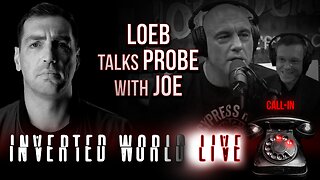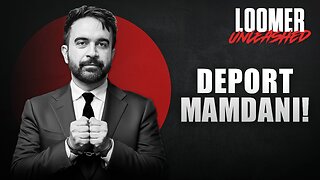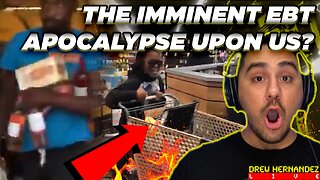Premium Only Content

Episode 3139: The Protestant Influence: Six Ministers and the Making of the Novus Ordo - Morning Episode
Nightly Zoom Coordinates for Rosary:
Meeting ID: 865 8978 0399
Passcode: Wjjv4960!
Speak Lord for your Servant is Listening
Book Recommendation of the Day
“Vita Sancti Uodalrici” (Life of St. Ulrich), written by Gerhard of Augsburg between 982 and 993, is the earliest and most authoritative source on St. Ulrich, detailing his episcopate, defense of Augsburg during the Magyar siege, his miracles, and his resignation and death.
“The Protestant Influence: Six Ministers and the Making of the Novus Ordo”
INTRODUCTION
Welcome to Tradition & Triumph, where we look beyond the modern slogans to uncover the timeless truths of the one, holy, Catholic, and apostolic Church.
In this fifth installment of our Liturgical Revolution series, we address one of the most scandalous realities of the post-Vatican II Church:
That six Protestant ministers, representatives of sects founded in rebellion against the Holy Sacrifice of the Mass, were invited to advise in the creation of the Novus Ordo Missae.
Why were they there? What influence did they have? And what was the result of their involvement?
To answer these questions, we turn to history, eyewitness testimony, and Catholic doctrine and we approach it all through the lens of Sacred Tradition.
PART I: THE COUNCIL OPENS THE DOOR
Vatican II and the Spirit of Ecumenism
With the promulgation of Unitatis Redintegratio (1964), the Council declared:
“The way and method in which Catholic belief is expressed should never be an obstacle to dialogue with separated brethren.”
This was a massive paradigm shift. Where earlier Councils like Trent had condemned Protestant errors and affirmed Catholic dogma without ambiguity, Vatican II introduced a pastoral policy of inclusion and ambiguity.
This shift in tone directly influenced the reform of the liturgy. The desire to “remove obstacles” to Protestant unity became a blueprint for compromise.
PART II: ENTER THE PROTESTANT OBSERVERS
Between 1965 and 1969, as the Novus Ordo was being crafted, the Vatican's Consilium for Liturgical Reform under Archbishop Bugnini invited six Protestant ministers to participate in official liturgical discussions.
These men weren’t just “guests.” They were given access to internal documents, permitted to offer suggestions, and even participated in working groups that shaped the new rite.
Who were they?
Name Affiliation Theological Stance
Dr. George H. Tavard Methodist Denied the Real Presence and priestly sacrifice
Canon Jasper Anglican Affirmed memorial view of Eucharist
Dr. Ronald Jasper Anglican Advocated vernacular, communal worship
Max Thurian Taizé (Reformed Calvinist) Rejected sacrificial theology
Dr. Eugene Brand Lutheran (World Lutheran Federation) Denied transubstantiation
Pastor Friedrich Künneth German Lutheran Denied sacramental priesthood
These men belonged to confessions that had rejected the Catholic Mass for over 400 years. They viewed the Catholic Mass as idolatrous, corrupt, or unnecessary.
So why were they at the table?
Because Bugnini and his team sought to create a liturgy that Protestants could recognize, accept, and join in thus achieving a new kind of “unity.”
PART III: QUOTES AND CONFESSIONS
The scandal of their involvement was not kept secret. In fact, they were lauded by Vatican officials and openly shared their satisfaction.
Max Thurian (Taizé):
“It is now theologically possible for Protestants to celebrate the Lord’s Supper using the same texts as the Catholic Church.”
(La Croix, May 30, 1969)
Dr. Jasper:
“We found much to admire in the revised Catholic liturgy. It was clearer, simpler, more accessible... less alien to Protestant sensibilities.”
Fr. Louis Bouyer (Reformer turned critic):
“The reformers worked in haste and confusion. Eucharistic Prayer II was composed on a café napkin in one afternoon.”
Bouyer, who helped draft parts of the reform, later denounced the process as theological and liturgical vandalism.
PART IV: WHAT DID THEY CHANGE?
Let’s break down the doctrinal changes, not just in language, but in essence.
1. The Offertory Prayers
Before (Traditional Latin Mass):
• “Receive, O Holy Father, Almighty and Eternal God, this spotless host…”
• “We offer Thee… for our sins, offenses, and negligences…”
After (Novus Ordo):
• “Blessed are you, Lord God of all creation…”
These Jewish-style blessings are not explicitly sacrificial. They emphasize community offering rather than priestly oblation.
Why was this done?
Protestant reformers rejected the idea of propitiatory sacrifice. By using vague, universalist prayers, the new rite removed offense.
2. The Canon of the Mass (Eucharistic Prayer)
The Roman Canon, unchanged for 1,400 years, was made optional in the Novus Ordo. It was replaced or supplemented by:
• Eucharistic Prayer II: ambiguous and minimalist
• Eucharistic Prayer III: a modern creation
• Eucharistic Prayer IV: based on Eastern liturgies but stripped of sacrificial theology
The new Eucharistic prayers do not clearly affirm:
• The Real Presence
• The sacrificial nature of the Mass
• The unique role of the ordained priest
Fr. Anthony Cekada called EP II “a Protestant communion prayer in a Catholic wrapper.”
3. From Sacrifice to Supper
Every gesture, symbol, and phrase in the traditional Mass was oriented toward Calvary.
• Ad orientem: facing the East, facing God.
• Altar stone: symbol of Christ.
• Genuflections and Signs of the Cross: affirm the Real Presence.
In the Novus Ordo:
• Versus populum: priest faces the people, like a Protestant minister.
• Altar becomes a table: mimics Lutheran or Anglican settings.
• Silence removed: dialogue replaces mystery.
• Communion in the hand, standing: erodes reverence.
These changes mirror Protestant services and were welcomed by Protestant observers as a step toward “unity.”
PART V: THE CONSEQUENCES
The fruit of this ecumenical experiment?
• 70% of Catholics no longer believe in the Real Presence (Pew, 2019).
• Mass attendance has dropped worldwide since the 1970s.
• Seminaries are empty in dioceses that embrace modern liturgy.
• Irreverence and abuses are common: clown Masses, dance Masses, lay preaching.
Lex orandi, lex credendi.
As we worship, so we believe. And if the Mass no longer expresses the Faith, the people will no longer hold the Faith.
PART VI: THE THEOLOGICAL FOUNDATION DESTROYED
The Protestant ministers came not to learn, but to reshape.
They helped make a liturgy that:
• Avoided references to the Mass as a sacrifice
• Omitted sacrificial vocabulary
• Shifted the focus from priest to people
• Deemphasized Transubstantiation and the altar
This is not accidental. This is the logical fruit of Vatican II's ecumenical orientation, combined with the theological cowardice of the reformers.
“What concord hath Christ with Belial? Or what part hath the faithful with the unbeliever?”
2 Corinthians 6:15
PART VII: THE RESPONSE OF FAITHFUL CATHOLICS
1. Cling to the Traditional Latin Mass
The TLM contains:
• Clear language of sacrifice.
• Profound silence and mystery.
• Orientation toward God.
• The same theology that inspired saints and martyrs.
2. Read and Share the Warnings
• The Ottaviani Intervention (1969)
• The Rhine Flows into the Tiber by Fr. Wiltgen
• Liturgical Time Bombs by Michael Davies
3. Pray for Restoration
The modern liturgical collapse is not final. As more Catholics return to tradition, we will see:
• Vocations increase
• Devotion to the Blessed Sacrament restored
• A generation raised on truth, not compromise
St. Pius V foresaw this when he codified the Roman Rite in 1570 and warned against tampering with it.
“Let all everywhere adopt and observe what has been delivered by the Holy Roman Church.” – Quo Primum
Today is Thursday, July 10th, 2025, and we reflect upon the deep beauty of virtue, the mystery of spiritual kinship in Christ, and the heroic faith of martyrs who stood firm in the face of pagan cruelty.
Let us begin with the readings from today’s Mass according to the 1945 St. Andrew’s Daily Missal.
Epistle – Proverbs 31:10–31
"Who shall find a valiant woman? Far and from the uttermost coasts is the price of her. The heart of her husband trusteth in her, and he shall have no need of spoils... She hath opened her mouth to wisdom, and the law of clemency is on her tongue... Favour is deceitful, and beauty is vain: the woman that feareth the Lord, she shall be praised."
Reflection on the Epistle:
The Church lifts up the image of the mulier fortis the valiant woman not as an ideal of worldly beauty or influence, but of sanctified virtue and industrious love. This passage from Proverbs has often been seen not only as a tribute to godly women, but also allegorically to the Church herself, the spotless Bride of Christ.
The valiant woman is strong not in stature, but in faith. She works with her hands, not to amass wealth, but to care for her household in wisdom and charity. In an age of vanity and self-promotion, this reading reminds us that the crown of womanhood is holy fear of the Lord, not passing appearances.
In the lives of the saints, especially the virgin martyrs like Saints Rufina and Secunda, we see this passage fulfilled. Though young, they were clothed in the dignity of purity, wisdom, and unshakable devotion to Christ.
Gospel – Matthew 12:46–50
"And one said unto him: Behold thy mother and thy brethren stand without, seeking thee. But he answering him that told him, said:Who is my mother, and who are my brethren? And stretching forth his hand towards his disciples, he said: Behold my mother and my brethren. For whosoever shall do the will of my Father that is in heaven, he is my brother, and sister, and mother."
Reflection on the Gospel:
Christ’s words here are not a dismissal of His Blessed Mother far from it. Rather, they reveal the deeper spiritual reality: that the true family of God consists of those who do the will of the Father. In Mary, we see the perfect example of this obedience “Be it done unto me according to Thy word.”
And in the martyrs we remember today, we see that same obedience. They are not merely “saints” by title, but members of Christ’s family, adopted through suffering and faithfulness.
The seven holy brothers all martyrs along with Saints Rufina and Secunda, were knit into the family of God by their fidelity unto death. They heard the voice of the Shepherd and followed Him, even unto execution.
This Gospel challenges us to ask: Am I merely associated with the Church, or am I truly inside the family of God by obeying His will in my thoughts, habits, words, and sacrifices?
Saints of the Day – The Seven Holy Brothers and Saints Rufina and Secunda
Today the Church honors two commemorations:
1. The Seven Holy Brothers, sons of St. Felicitas, martyred in Rome under Antoninus Pius. One by one, these sons gave their lives rather than deny Christ a perfect image of familial virtue and unity in the Faith.
2. Saints Rufina and Secunda, Roman virgins who refused to marry pagans and were executed for the Faith in the 3rd century. Their chastity and courage reflect the spirit of the mulier fortis from Proverbs strong in God’s grace, even unto death.
Their blood became seed for the Church. Their memory is a reminder that Christian virtue is not abstract it has been lived in fire and blood by our predecessors.
Quotes and Themes for Meditation:
• “Favour is deceitful, and beauty is vain: the woman that feareth the Lord, she shall be praised.” — Proverbs 31:30
→ The interior life of grace is of greater value than all external charm.
• “Whosoever shall do the will of my Father… is my brother, and sister, and mother.” — Matthew 12:50
→ Spiritual kinship with Christ depends not on birth, but on obedience.
• St. Cyprian: “No one can have God as his Father who does not have the Church as his Mother.”
• Theme 1: True nobility is virtue, not social status.
• Theme 2: Obedience to God transforms human relationships into eternal bonds.
• Theme 3: Martyrdom is the supreme act of familial loyalty to God and His Church.
Conclusionary Prayer:
Let us close today’s episode in prayer.
O God, who didst crown the steadfastness of Thy holy martyrs the Seven Brothers, Saints Rufina and Secunda — grant that, through their intercession, we may be strengthened in faith and virtue, and counted worthy to be called Thy sons and daughters.
Make us valiant in charity like the holy woman of Scripture, obedient in all things like Thy Blessed Mother, and faithful unto the end like those who shed their blood for Thy Name.
Through the intercession of these glorious saints, may we love Thee with all our heart and soul, and take our place in Thy eternal household.
Through Christ our Lord. Amen.
St. Felicitas and her Seven Sons, pray for us.
Saints Rufina and Secunda, pray for us.
Our Lady, Refuge of Sinners, protect us.
In the name of the Father, and of the Son, and of the Holy Ghost. Amen.
Join us again tomorrow as we continue walking through the Church's liturgical year with Scripture, Tradition, and the Saints as our companions.
-
 2:10:06
2:10:06
The Michelle Moore Show
1 day ago'Capitol Tunnels, DC Doctored Crimes Scandal, Jesus In History Books, Pinktober Darkside & more' Guest, Lt. Mark Taylor: The Michelle Moore Show (Oct 27, 2025)
20.3K90 -
 LIVE
LIVE
Lofi Girl
2 years agoSynthwave Radio 🌌 - beats to chill/game to
185 watching -
 3:05:31
3:05:31
Price of Reason
11 hours agoTrump DHS Shakeup? Sydney Sweeney Christy Movie EARLY Review! Disney JUMP Ship After Doctor Who FAIL
179K8 -
 2:44:01
2:44:01
Badlands Media
10 hours agoDEFCON ZERQ Ep. 015: The Hidden Hand, UFOs, and the Global Awakening
132K69 -
 2:03:09
2:03:09
Inverted World Live
10 hours agoLoeb Talks Probe with Joe | Ep. 131
75.8K9 -
 3:06:01
3:06:01
TimcastIRL
8 hours agoGOP Declares Biden Pardons VOID Over Autopen, DOJ Announces Investigation | Timcast IRL
245K191 -
 2:51:22
2:51:22
Laura Loomer
8 hours agoEP153: DEPORT MAMDANI!
49.7K49 -
 1:03:39
1:03:39
Flyover Conservatives
1 day agoAre ‘Aliens’ Really Demons? The Coming Digital ID System - Dr. Stella Immanuel; Frequencies of Control - Leigh Dundas | FOC Show
47.8K7 -
 4:36:58
4:36:58
Drew Hernandez
23 hours agoINCOMING: IMMINENT EBT APOCALYPSE IS UPON US?!
39.7K15 -
 25:47
25:47
Robbi On The Record
2 days ago $6.51 earnedExposing the OnlyFans Industry (Agency Edition)
42.9K15